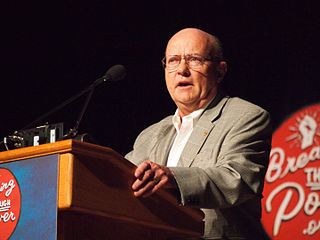A Quote by R. Buckminster Fuller
Specialization breeds biases that ultimately aggregate as international and ideological discord, which, in turn, leads to war.
Quote Topics
Related Quotes
Snowden is not the disease. We don't have traitors or whistleblowers blooming all over because they are some sort of malady. The disease is war. We've been at war now and with no end in sight for over a dozen years, the longest in our history. War breeds tyranny. War breeds people who want to prosecute and persecute those who reveal that tyranny. So what we have is the government becoming more draconian - clearly understandable. It always does in a period of war. And as it becomes more draconian, more and more whistleblowers coming.
The weaknesses and biases of the international mechanisms of accountability make it seem desirable to extend the domain of accountability by empowering domestic courts to act as agents of the world legal system. Even if there is no consistent application of Universal Jurisdiction, it still leads those who might be prosecuted to alter their travel plans to avoid even the complication of waiting for a complaint to be dismissed.
If the World War [I] demonstrated anything it was that government ownership is fraught with the gravest dangers and usually leads to disaster. Take Britain. The two problems which have caused the greatest trouble since the war ended have been transportation and coal. The government seized both industries when the war broke out. It got them into such a hopeless mess that it does not know how to turn [In] coal; the government now realizes, it took hold of the tail of a wild animal and is afraid to let go.
One can say that the author is an ideological product, since we represent him as the opposite of his historically real function. (When a historically given function is represented in a figure that inverts it, one has an ideological production.) The author is therefore the ideological figure by which one marks the manner in which we fear the proliferation of meaning.
[A]t the beginning of November 2001, there was a series of meetings between White House advisers and senior Hollywood executives with the aim of co-ordinating the war effort and establishing how Hollywood could help in the "war against terrorism" by getting the right ideological message across not only to Americans, but also to the Hollywood public around the globe the ultimate empirical proof that Hollywood does in fact function as an "ideological state apparatus.
I can probably earn more in an hour of writing or even teaching than I could save in a whole week of cooking. Specialization is undeniably a powerful social and economic force. And yet it is also debilitating. It breeds helplessness, dependence, and ignorance and, eventually, it undermines any sense of responsibility.





































